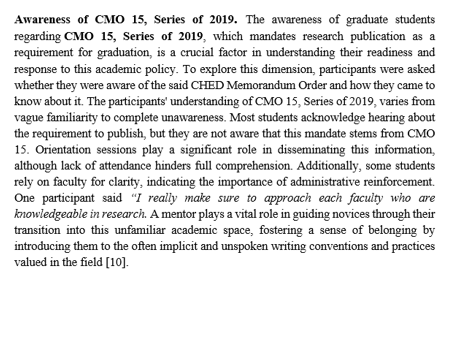Navigating Academia: Lived Experiences of Graduate Students Under CMO 15, S. 2019
DOI:
https://doi.org/10.69478/BEST2025v1n1a017Keywords:
Phenomenology, CHED CMO 15 S. 2019, Publication Requirement, Academic SupportAbstract
This phenomenological study explored the lived experiences of graduate students navigating the challenges of research publication as mandated by the Commission on Higher Education (CHED) through CMO No. 15, Series of 2019. The study sought to understand how students perceived and respond to the requirement to publish prior to graduation. Data were gathered from in-depth interviews with seven graduate students and analyzed to extract significant statements, formulated meanings, clustered themes, and developed exhaustive descriptions. The analysis revealed six major themes: (1) emotional responses to the publication requirement, such as anxiety, fear, and self-doubt; (2) recognition of publication as a tool for academic and professional growth; (3) limited awareness and understanding of the CMO 15 policy; (4) multifaceted challenges, including financial cost, time constraints, and difficulty selecting legitimate journals; (5) varied levels of support from advisers and institutions; and (6) the crucial role of institutional support mechanisms such as research trainings, workshops, and personalized mentoring. These findings suggest that while graduate students perceive the publication requirement as both daunting and valuable, successful compliance is heavily influenced by institutional scaffolding, advisor guidance, and access to financial and academic resources. The study recommends stronger implementation of structured mentoring programs, regular training workshops, and transparent communication of academic policies. The insights gained provide a foundation for improving graduate education policies and support systems that uphold both academic rigor and student well-being.
References
Commission on Higher Education, “CHED Memo No. 15. Policies, Standards, and Guidelines For Graduate Programs,” 2019, https://www.feu.edu.ph/wp-content/uploads/2024/05/CHED-Memorandum-Order-No.-15-Series-of-2019-compressed.pdf.
N. J. Castulo, “A Policy Brief on CMO 15. S. 2019: Strategies for Enhancing Educational Research Productivity in Philippine Higher Education Institutions,” Journal of Education & Learning Advancement, vol. 1, no. 1, June 2024, pp. 152-164, http://dx.doi.org/10.2139/ssrn.5030248.
W. F. Pangket, S. K. K. Pangesfan, J. P. Cayabas, G. L. Madjaco, “Research Writing Readiness of Graduate Students in a Philippine State College,” International Journal of Learning, Teaching and Educational Research, vol. 22, no. 4, April 2023, pp. 141-159, https://doi.org/10.26803/ijlter.22.4.9.
E. M. A. Jordão, “PhDs in Brazil are Perishing Even When They Publish,” Nature Human Behaviour, vol. 3, October 2019, https://doi.org/10.1038/s41562-019-0723-2.
Z. Makola, N. Ntoyanto-Tyatyantsi, “Post Graduate Students’ Experiences with Research Ethics: A South African Perspective,” Journal of Empirical Research on Human Research Ethics, vol. 18, no. 4, July 2023, pp. 208-217, https://doi.org/10.1177/15562646231188004.
M. Landgrave, “Cooling Publication Fever in Under-Represented Graduate Students,” Nature Human Behaviour, vol. 3, October 2019, https://doi.org/10.1038/s41562-019-0676-5.
V. S. Casanova, “Predictors of Graduate Students’ Research Performance in the Philippine State-Run Higher Education Institution,” Journal of Education and Learning, vol. 10, no. 5, August 2021, pp. 170-176, https://doi.org/10.5539/jel.v10n5p170.
N. J. Castulo, A. C. Marasigan, M. L. D. Buenaventura, J. L. de Vera, E. C. Bagaporo, M. P. C. San Juan, N. S. Dalida, “Contextualizing the Challenges of Education Graduate Students in the Philippines: Translating Needs Analysis into Strategic Solutions,” Discover Education, vol. 4, February 2025, https://doi.org/10.1007/s44217-025-00416-7.
S. van Schalkwyk, A. Kuper, P. O’Sullivan, “Mentoring the Writing: A Tricky Task for Research Supervisors in the Dissemination of Scholarly Work,” Advances in Health Sciences Education, vol. 30, May 2025, pp. 675-677, https://doi.org/10.1007/s10459-025-10445-4.
Z. Yu, B. Ma, L. Song, C. Guo, Q. He, “Identification of Knowledge Anxiety Factors Among Researchers Based on Grounded Theory,” Heliyon, vol. 10, no. 4, February 2024, https://doi.org/10.1016/j.heliyon.2024.e25752.
S. Raksithaa, “Publication Stress Amongst Scholars and Faculties: A Concern of Mental Health,” Mental Health and Social Inclusion, December 2024, https://doi.org/10.1108/MHSI-10-2024-0177.
J. B. Quinto, “CMO 19, S. 2019: Graduate Students, Are You Ready for This?,” Journal of International Education, vol. 4, no. 1, November 2022, pp. 54-62, https://philpapers.org/archive/QUICN.pdf.
S. Bayona-Oré, C. Bazan, “Why Students Find it Difficult to Finish Their Theses?,” Journal of Turkish Science Education, vol. 17, no. 4, December 2020, pp. 591-602, https://doi.org/10.36681/tused.2020.47.

Downloads
Published
Issue
Section
Categories
License
Copyright (c) 2025 Jennifer A. Gorumba (Author)

This work is licensed under a Creative Commons Attribution-NonCommercial 4.0 International License.



